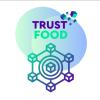Introduction to Blockchain in the Food Supply Chain: Building Trust and Ensuring Safety (TRUST-FOOD)
The objective of the course ‘Introduction to Blockchain in the Food Supply Chain: Building Trust and Ensuring Safety’, designed within the scope of the EU-funded TRUST-FOOD project, is to provide participants with an understanding of blockchain technology and its applications in the food supply chain
The aim of the project, which is funded under the DIGITAL Europe Programme of the European Union, is to create a database of courses that support the sustainable up- and re-skilling of EU workforce, with a particular focus on SME owners, managers, and employees.
About this course
This course will guide you through how blockchain can enhance transparency, improve food safety, and foster trust among stakeholders within the food supply chain. You will begin by understanding the essentials of the food supply chain and the challenges its stakeholders face. You will explore the core principles of blockchain technology, including key features such as immutability and decentralization, while examining different types of blockchain, their advantages, disadvantages, and real-world applications. You will learn how blockchain’s inherent characteristics can be leveraged to build trust and ensure food safety, supported by real-world examples. Finally, you will analyze real-world implementations of blockchain in the food supply chain through case studies and explore future trends in the field.
Target audience
The course is ideal for university students and graduates, business managers and business owners, agrifood company employees, as well as personnel in sectors related to food supply chains. This course is ideal for trainees interested in policy, governance, and ethical aspects.
Learning material and resources
This course is broken down in 8 lessons and conducted in English. A quiz at the end of each lesson tests learners' understanding of the concepts introduced. Students need approximately 8.5 hours of study time to complete this course and can get a free certificate to attest their participation.


